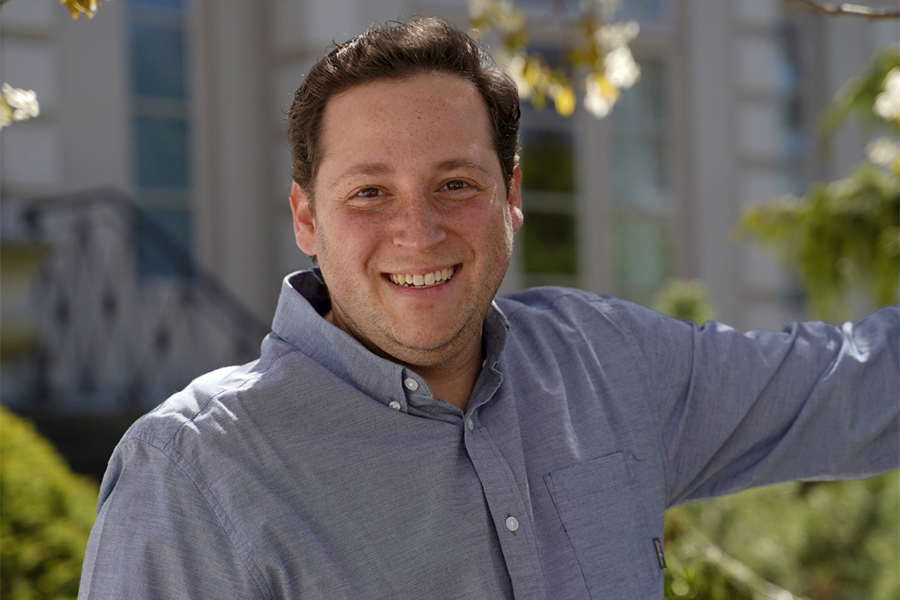An online, self-directed intervention “allowed us to reach out to people who may not be willing or able for a number of reasons to have psychotherapy with a therapist,” says Dr. Kathryn Trottier, psychologist and RESTORE’s primary developer. (Photo: UHN)
The COVID-19 pandemic unleashed countless challenges and hardships, but for mental health care providers there has been a silver lining: improvements to accessibility through the widespread adoption of virtual care.
In the past three years, virtual appointments across University Health Network (UHN) have soared from 260 a week to close to 10,000. The UHN Centre for Mental Health has seen an overwhelming majority – more than 80 per cent – of its outpatient appointments conducted virtually, outpacing all other UHN programs.
“Mental health has been a shining star for virtual care,” says Jennifer Catton, Director, Outpatient Strategy & Diagnostic Performance, speaking in advance of Wednesday, Jan. 25, the 13th annual Bell Let’s Talk Day, an initiative aimed at raising awareness and acceptance of mental health care issues.
Mental health care, which often involves talk therapy, lends itself well to virtual delivery. Patients benefit from the accessibility and flexibility, but also the greater sense of privacy that comes with a virtual appointment.
For patients such as Robert Stainton, the shift to virtual care has been a positive experience. After a relapse in his mental health, he was referred to UHN’s Poul Hansen Family Centre for Depression for a medication consultation.
Rather than travel two hours from London, Ont., to Toronto Western Hospital, he was able to connect with a psychiatrist virtually.
“I didn’t have to get in a car or even leave work,” he says. “I just closed the door to my office and clicked on the link.”
Robert later attended group therapy sessions with the centre. These had always been open to patients from across Ontario, but prior to the adoption of virtual care, travel was a barrier for many.
Pre-pandemic, administrative and technological barriers also fed a perception that virtual care was not the best, safest or easiest option for care providers or patients.
That has since changed. Recent UHN Patient Experience data indicates that more than 80 per cent of patients hope and expect their future care to be delivered virtually where suitable.
“The pandemic did wonders at reducing that fear,” Jennifer says. “It was the best change management strategy possible, forcing us into this head first.”

Self-directed intervention
A recent initiative at the UHN Centre for Mental Health is taking virtual care even further.
Dr. Kathryn Trottier, a psychologist and Clinical Lead of UHN’s Eating Disorders Program, developed RESTORE, an intervention designed to help people recover from extremely stressful experiences related to the pandemic.
Informed by evidence-based therapies and literature from previous coronavirus outbreaks, RESTORE is transdiagnostic, addressing a collection of mental health problems, specifically anxiety, depression and PTSD – not just one.
Initially, Dr. Trottier envisioned that RESTORE would be delivered as psychotherapy through video conferencing. But a conversation with Dr. Candice Monson, professor of psychology at Toronto Metropolitan University, a collaborator on the project and one of the world’s foremost experts on recovery from traumatic stress, led to the project becoming an online, self-directed intervention.
“It was completely new territory for me,” says Dr. Trottier. “It made a lot of sense in that it allowed us to reach out to people who may not be willing or able for a number of reasons to have psychotherapy with a therapist.”
Through eight modules that include written information, videos and interactive exercises, participants work at their own pace to learn recovery skills. Surveys on stressor reactions before each module allow participants to track their progress though the program, which they have eight weeks to complete.
Each participant is assigned a guide who is available to coach and encourage them through a messaging system or calls.
Initially launched for health-care workers during the Delta Wave of the pandemic in 2021, RESTORE has since expanded and is now available for free to all Canadians.
Adults 18 and older living in Canada who experienced or are experiencing traumatic or extremely stressful responses related to COVID-19 can sign up at restoreonline.ca.
Results to date, published in a small uncontrolled study, are encouraging and indicate large effect size improvements in anxiety, depression and PTSD.
“The size of the improvements were similar to what we see with face-to-face evidence-based psychotherapies,” says Dr. Trottier. “That was pretty exciting.”
Virtual care is not suitable for all mental health patients
While COVID’s impact on mental health has not gone away, Dr. Trottier is thinking of ways to expand the project’s reach.
“For other groups who have traumatic experiences – first responders, people who have experienced sexual assaults or mass casualty situations – RESTORE might also be very helpful for them,” she says.
Challenges remain with virtual care. Not all patients have access to digital devices or possess technical literacy. Some do not have access to a private space necessary for an appointment. Additionally, programs such as RESTORE are only available in English.
Virtual care is also not suitable for all mental health patients, particularly those with complex needs. In RESTORE’s case, intake questions screen out participants for suicidality who are then redirected to more appropriate support.
The delivery of virtual care continues to evolve. A greater proportion of appointments are now via video since the implementation of UHN’s new health information system from Epic, which seamlessly integrates with the virtual platform MS Teams.
UHN is also working towards converting phone appointments to video calls based on patient feedback, which indicated greater trust in the quality of care when delivered by video.
Despite the ongoing impact of COVID-19 on mental health, virtual care is here to stay.
“The biggest lesson we learned during the pandemic was how possible and welcomed switching to virtual care could be,” says Jenna McLeod., Interim Operations Lead, UHN Centre for Mental Health.
Donate to drive life-saving research in mental health.


